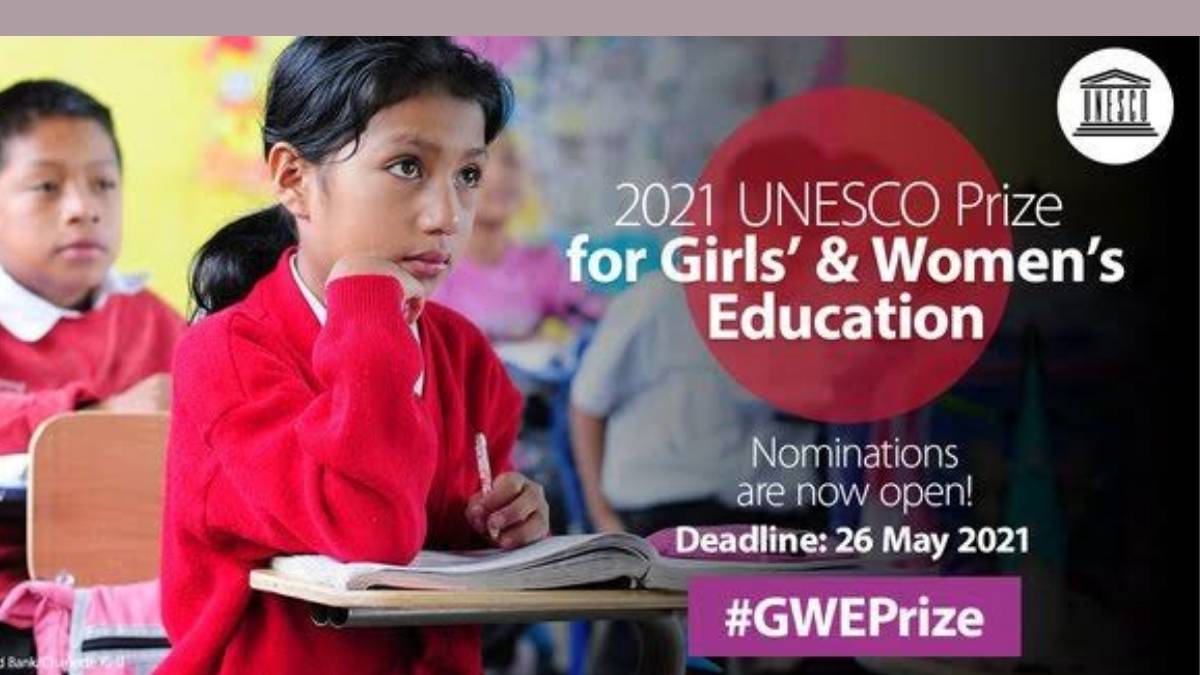UNESCO Prize For Girls’ And Women’s Education Key details:
- Host country: United Kingdom
- Open to: All Nationals
- Targets: Girls and Women
- Deadline: 26th May, 2021
The 2021 UNESCO Prize for Girls’ and Women’s Education call for nominations was announced by UNESCO on International Women’s Day. The Prize worth US$50,000 is awarded each year on two laureates who have made outstanding contributions to the education of girls and women.
In the midst of the COVID-19 pandemic, and in a context where girls and women have been disproportionately affected by nationwide school closures, ensuring that girls and women continue to learn must be a top priority. According to UNESCO, over 11 million girls and young women may be unable to return to school as a result of the pandemic’s impact. This is in addition to the 128 million girls who had previously dropped out of school before the pandemic.
The UNESCO Prize For Girls’ And Women’s Education is more important than ever in these trying times. Highlighting innovations that can assist us in fostering an equal future is critical in responding to global challenges related to girls’ and women’s education. Read on to learn more about the nomination process.
Interested candidates are invited to contact their country’s National Commission for UNESCO/Permanent Delegation to UNESCO, or an NGO in official partnership with UNESCO for more information.
UNESCO Prize For Girls’ And Women’s Education Selection Requirement
The two Prize laureates will be selected by UNESCO’s Director‐General on the basis of recommendations made by the independent International Jury of the UNESCO Prize for Girls’ and Women’s Education, consisting of five experts from all geographical regions.
Also read: UN Global Climate Action Award 2021
The nominations will only be considered if the project/program:
- has a clear focus on advancing girls’ and women’s education, and the promotion of gender equality in and through education, and contributes to one or more of the five priority areas of the Prize:
- Participation: Supporting girls to transition from primary education to lower‐secondary education and to complete full basic education
- 2. Literacy: Supporting adolescent girls and young women to acquire literacy skills
- 3. Environment: Supporting the creation of a gender‐responsive and safe teaching‐learning environment
- 4. Teachers: Engaging teachers to be change agents with gender‐responsive teaching attitudes and practices.
- 5. Skills: Supporting girls and women to acquire knowledge/skills for life and work has already been running for at least two years; and shows evidence that it may be replicable, scalable, and/or provide significant learning potential for initiatives in other contexts
- Once it has passed the basic eligibility requirements, the project/program of the candidate will be assessed by the Jury based on the following three criteria:
UNESCO Prize For Girls’ And Women’s Education Submission Procedure
(1) Nominations must be submitted online in English or French by the Permanent Delegation to
UNESCO of the concerned Member State, or by an NGO in official partnership with UNESCO.
(2) Permanent Delegations to UNESCO may access the online submissions platform through
their official UNESCO account using the following link: http://unesco.org/gwe.
(3) NGOs in official partnership with UNESCO can request access to the platform via the
following link: http://www.unesco.org/gwe‐ngo.
(4) It is possible for National Commissions for UNESCO to access and complete the online form.
However, any nomination by a National Commission will need to be submitted by the
Permanent Delegation to UNESCO of the respective Member State. An automatic notification
message confirming the submission will be sent to the official e‐mail address of the
Delegation.
(5) If a National Commission or Permanent Delegation to UNESCO wishes that the candidate
complete the online nomination form directly, UNESCO can create an account for each
candidate. A request should be sent to [email protected] by the National Commission
or Permanent Delegation before 20 May 2021. After completion of the online form by the
candidate, the concerned National Commission and Permanent Delegation will receive a
notification e‐mail and can review the nomination before the Permanent Delegation submits
it to UNESCO.
(6) Attention should be paid to presenting the project/program of the candidate in a clear
and structured way, following the instructions given in the form and respecting the indicated
word limit. All supporting material (e.g. action plans, publications, videos) must be
transmitted electronically through the online system.
(7) Nominations must be submitted via the online platform by the concerned Permanent
Delegations to UNESCO or NGOs by midnight of 26 May 2021(UTC+1, Paris time). Kindly note
that each Permanent Delegation or NGO may not submit more than three nominations. Any
additional nominations will not be taken into consideration.
For any question regarding the UNESCO Prize for Girls’ and Women’s Education or the submission process, please contact the Secretariat of the Prize at the Section of Education for Inclusion and Gender Equality at UNESCO: Tel: +33 (0) 1 45 68 11 34 / 10 08; e‐mail: [email protected].
Also read: Siemens Stiftung E-Mobility Innovation Award for African Entrepreneurs 2021
UNESCO Prize For Girls’ And Women’s Education Application Procedure
Nominations are to be made by completing the Nomination Form. The form is only for informational purposes. The nomination form must be completed online in English or French via the UNESCO website using the button below. Submissions made on paper will not be accepted.
For more information visit the official website of UNESCO Prize For Girls’ And Women’s Education 2021

